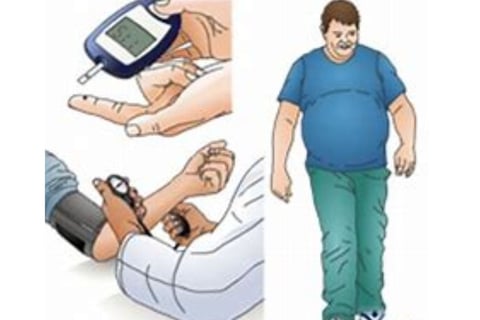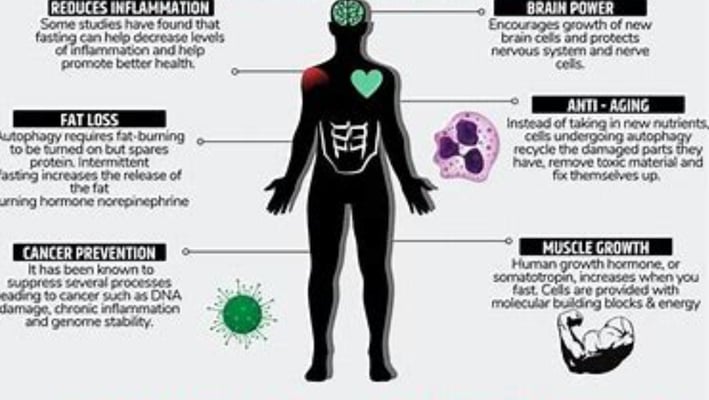
Fasting : for Acute Diseases
Discover the opportunity to use intermittent fasting and Islamic fasting as safe and effective treatments for many acute diseases, either alone or in combination with traditional medicine. Explore ...
FASTING
Dr Hassan Al Warraqi
6/9/2024
Fasting for Acute Illnesses
Fasting, either alone or in combination with tranditional medicineasting, either alone or in combination with tranditional medicine
Fasting is abstaining from eating and drinking for specified periods of time.
Fasting has been used since ancient times as a treatment for many diseases, including acute diseases.
This approach involves abstaining from food and sometimes fluids for a specific period of time each day,
allowing the body to rest, heal and recover naturally.
By abstaining from eating, the body's energy is redirected towards the immune system to help fight diseases
Enhancing its ability to fight infections and restore health.
Fasting can also help relieve symptoms such as fever, inflammation, and pain associated with various acute illnesses.
When combined with translational medicine, which may include conventional treatments or conventional supportive therapies, the healing process can be further facilitated.
This holistic approach aims to enhance the body's innate healing mechanisms and provide relief from acute illnesses.
It is believed that fasting works on acute diseases through a number of mechanisms, including:
Activating the immune system: Fasting increases the activity of immune cells, which helps the body fight infection.
Reducing inflammation: Fasting reduces levels of inflammation in the body, which helps relieve the symptoms of acute diseases.
Improving the functions of vital organs: Fasting improves the functions of vital organs, which helps the body recover from illness faster.
Some acute diseases that fasting can help treat
Infections: such as respiratory system infections, gastrointestinal infections, joints and urinary system infections.
Autoimmune diseases: such as rheumatoid arthritis, type 1 diabetes, and Crohn's disease.
Cancer: Some studies have found that fasting may help reduce the growth of cancer cells and improve the chances of recovery,
help tolerate chemotherapy and radiation treatment, and prevent the recurrence of tumors.
Other diseases: such as inflammation of the kidneys, liver, pancreas, meningitis, etc.
When the body is in a fasting state, it undergoes a process called autophagy, where damaged cells are broken down and recycled.
This process helps to remove toxins and waste materials from the body, allowing it to heal more efficiently.
Possible side effects of fasting
In general, fasting is safe for most healthy people, but some people may experience mild side effects, such as:
Headache.
Dizziness.
Tired.
Feeling hungry.
fasting may be unsafe, such as:
Pregnant or breastfeeding women.
children.
People with certain chronic health conditions, such as heart disease, diabetes, or high blood pressure.
Duration of fasting
The duration of fasting depends on the medical condition being treated, as it may range from several hours to several days.
How to supervise the patient while fasting
The doctor conducts medical examinations for the patient before fasting,
then monitors his health condition during fasting.
The doctor may ask the patient to undergo some medical tests after fasting to ensure his safety.
Or the patient fasts while paying attention to the warnings.
Conclusion
Fasting is a safe and effective treatment for many acute diseases, but it must be done with caution.
If you suffer from an acute illness, such as a respiratory or digestive system infection, or other infections, such as influenza, diarrhea, or a herniated disc, start fasting.
Use intermittent fasting or Islamic fasting alone or in combination with traditional medicine
It is a treatment opportunity that you should not deprive yourself of
It has been tried and tested for me, such as respiratory infections, herniated disc, typhoid, etc., where fasting was a good aid to recovery.
key words
Fasting, acute illnesses, alone, in combination with traditional medicine, opportunity, intermittent fasting, Islamic fasting, safe, effective,safe, effective treatment, many acute diseases,
Frequently Asked Questions About Fasting and Its Health Benefits FAQS
What is fasting, and what are its main types?
Fasting is the practice of abstaining from food and drink for a specific period. There are various types of fasting, including:
Intermittent fasting: Alternating between periods of fasting and eating, such as fasting for 16 hours and eating during an 8-hour window.
Extended water fasting: Abstaining from all food and drink except water for 24 hours or several days, typically requiring medical supervision.
Islamic fasting (Ramadan): Abstaining from food and drink from dawn (Fajr) until sunset (Maghrib) during the month of Ramadan.
Voluntary fasting: Non-obligatory fasts performed for spiritual or health purposes.
What are the main health benefits of fasting?
The potential health benefits of fasting include:
Improved blood sugar control.
Enhanced heart health by lowering bad cholesterol (LDL), increasing good cholesterol (HDL), and reducing inflammation.
Boosted brain health through the stimulation of autophagy (cellular self-cleaning).
Promotion of weight loss and increased physical activity.
Strengthened immune system.
Improved digestive health.
Reduced inflammation and oxidative stress.
Stimulation of autophagy and stem cell production.
Prevention and support in cancer treatment.
How does fasting improve blood sugar control?
Fasting improves insulin sensitivity, reducing blood sugar levels. During fasting, the body shifts to using stored fat as its primary energy source, reducing dependence on glucose.
This helps stabilize blood sugar levels and lowers the risk of type 2 diabetes.
How does fasting affect heart and vascular health?
Fasting positively impacts heart health by lowering bad cholesterol (LDL) levels and raising good cholesterol (HDL) levels.
It also reduces inflammation and improves vascular function, thereby lowering the risk of cardiovascular diseases such as heart attacks and strokes.
What is autophagy, and how does fasting stimulate it?
Autophagy is a natural process in the body that involves clearing damaged cells and recycling their components.
Fasting stimulates this process, promoting cellular renewal and overall health. This may also reduce the risk of diseases such as Alzheimer's and dementia.
How does fasting aid in weight loss, and what is its relationship with growth hormone?
During fasting, the body relies on stored fat for energy, promoting fat burning and weight loss. Fasting also increases the levels of growth hormone, which supports muscle growth and enhances physical activity.
Are there recommendations or precautions for starting fasting?
Yes, several important guidelines should be followed:
Consult a doctor before starting any fasting regimen, especially for individuals with chronic conditions or those taking medications.
Consume balanced meals after fasting to replenish lost nutrients.
Start with shorter fasting periods and gradually extend them to avoid potential side effects.
Is fasting beneficial for cancer prevention or treatment?
Research suggests that fasting may enhance the effectiveness of chemotherapy and radiation therapy while protecting healthy cells from damage.
It may also reduce the risk of cancer recurrence. However, consulting a physician is essential before incorporating fasting into a cancer treatment plan.
keywords
Fasting, intermittent fasting, extended water fasting, Islamic fasting, autophagy, stem cells, blood sugar control, heart health, cholesterol, inflammation, weight loss, growth hormone, immune system, digestive health, oxidative stress, cancer prevention, cancer treatment, cellular renewal, chronic diseases, alternative therapy, medical supervision.
















